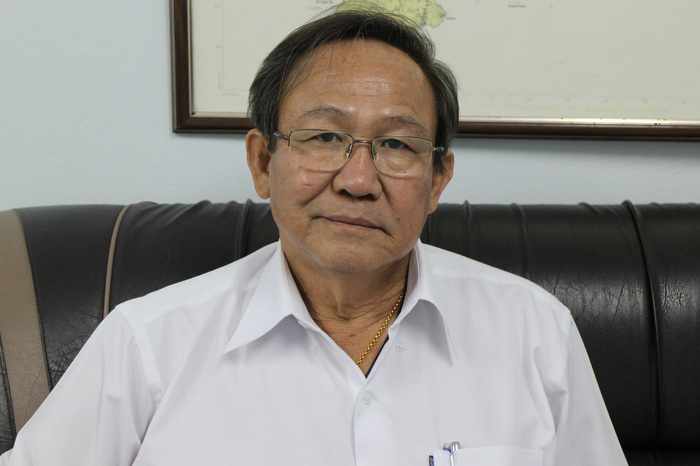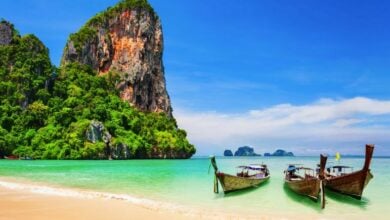Fishy business in Phuket

Kiettikun Charoensawan, 57, is chief of the Phuket Provincial Fisheries Office. He has a bachelor’s degree in Aquaculture from the Faculty of Fisheries at Kasetsart University and has served as director of several offices of the Inland Fisheries Research and Development Bureau. He most recently worked for two years as director of the bureau in Suphan Buri.
Here, he talks about why the fishing industry is important and how it can be sustained for future generations.
PHUKET: There are many fishermen who have built careers in this industry, and their lives around it. In Phuket, we are surrounded by marine life. It is very easy for us to make a living catching and selling fish and other aquatic animals as many people enjoy eating seafood in Phuket, whether they live here or are just here on holiday.
However, is very important that we employ sustainable fishing practices so that the industry can flourish for many years to come. We must prevent overfishing by making sure that fishermen fish only during the permitted times, in the permitted areas and only with fishing equipment that is in accordance with fishery law.
One way we aim for sustainability is by announcing a three-month fishing blackout period every year. This allows aquatic animals time to spawn and care for their young properly, which increases the population from which we can fish in the future.
We also support the aquatic population by promoting initiatives such as the Crab Bank Project. Any farmer that has a pregnant crab can bring the crab to us and we will take care of it until the crab spawns. After that, the eggs are released safely into the sea and the mother crab is sold.
In order to help young sea populations survive and thrive, we drop man-made, artificial reefs into the ocean to serve as habitats.
We also make a point of educating fishermen about the importance of marine conservation and the dangers of overfishing.
We are pushing for more and more fishermen to open their own fish farms so that they can have a chance for a more reliable income. Their success can be greatly affected by the monsoon season, as big waves and heavy storms often prevent them from going to sea. If they were to open a fish farm, they could catch fish whenever they were ready, rather than waiting for good weather to get on the boat.
I have heard many arguments against fish farms, the main one being that farmed fish taste different – namely, worse – than fish caught from the ocean. I disagree. Whether a fish comes from a farm or from the sea, they have the same taste and the same amount of protein.
Most fishermen are already well aware of which aquatic animals they should catch, and when and where they should go fishing. They know that they must be able to keep this job for as long as they are able, and preserve it for generations to come. Most importantly, they know what is at stake if they are unable to catch anything, so they do their best to protect the marine populations.
I have found that the real problem lies with foreign migrant workers that come to Thailand just to make money, for example Myanmar or Laos nationals. A lot of them just want to get the product as quickly as possible and get the job done. They don’t consider the impact they might have on their own future or that of generations down the road.
The best way to change this mindset is to talk to fishing boat operators and have them look out for and eradicate any harmful fishing practices. Another helpful tactic is to set up a team of volunteers to monitor fishing boats to make sure that they are using approved fishing equipment, such as regulation nets with appropriately sized holes so that young, small sea life can escape and continue to develop.
Phuket is a tourism province, and I would really like to integrate a true experience of the fishing industry into tourists’ holidays. I want to set up a home-stay program, so interested visitors can be paired up with a fisherman and learn about the trade. They would be educated about the industry, go out on the boat with the fisherman, learn how to safely and properly catch aquatic animals, then go back to the fisherman’s home and be shown how to cook the catch.
As of now, the human population continues to increase and so does the demand for seafood. I just want to strike a natural balance between what we take from the sea and what we give back to it. It is very easy to destroy an ecosystem if we need something from it, but we must not do that. We must continue to practice sustainable fishing, continue our research and look for ways to keep nature in balance.
— Saran Mitrarat
Join the conversation and have your say on Thailand news published on The Thaiger.
Thaiger Talk is our new Thaiger Community where you can join the discussion on everything happening in Thailand right now.
Please note that articles are not posted to the forum instantly and can take up to 20 min before being visible. Click for more information and the Thaiger Talk Guidelines.
Leave a Reply
You must be logged in to post a comment.









